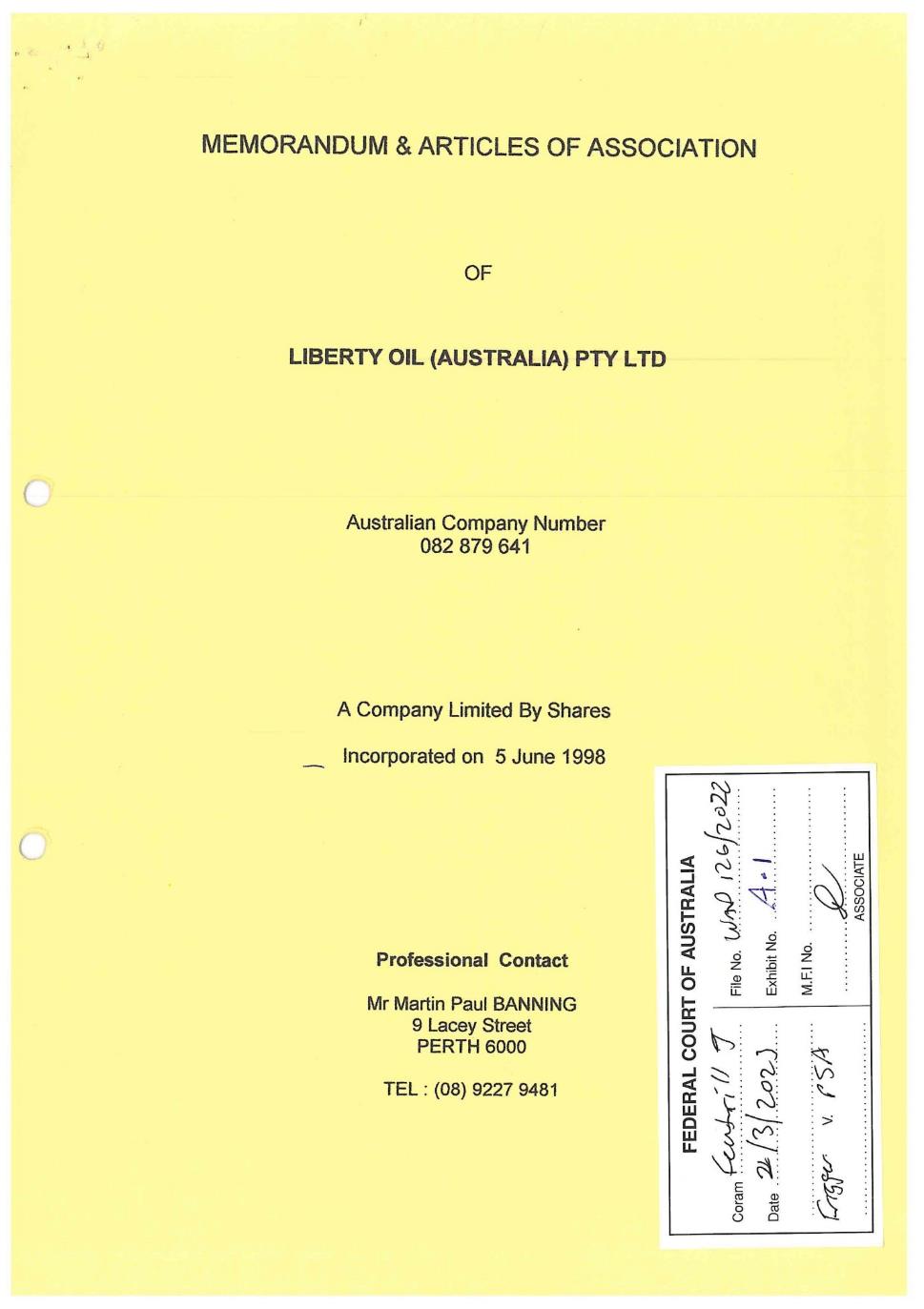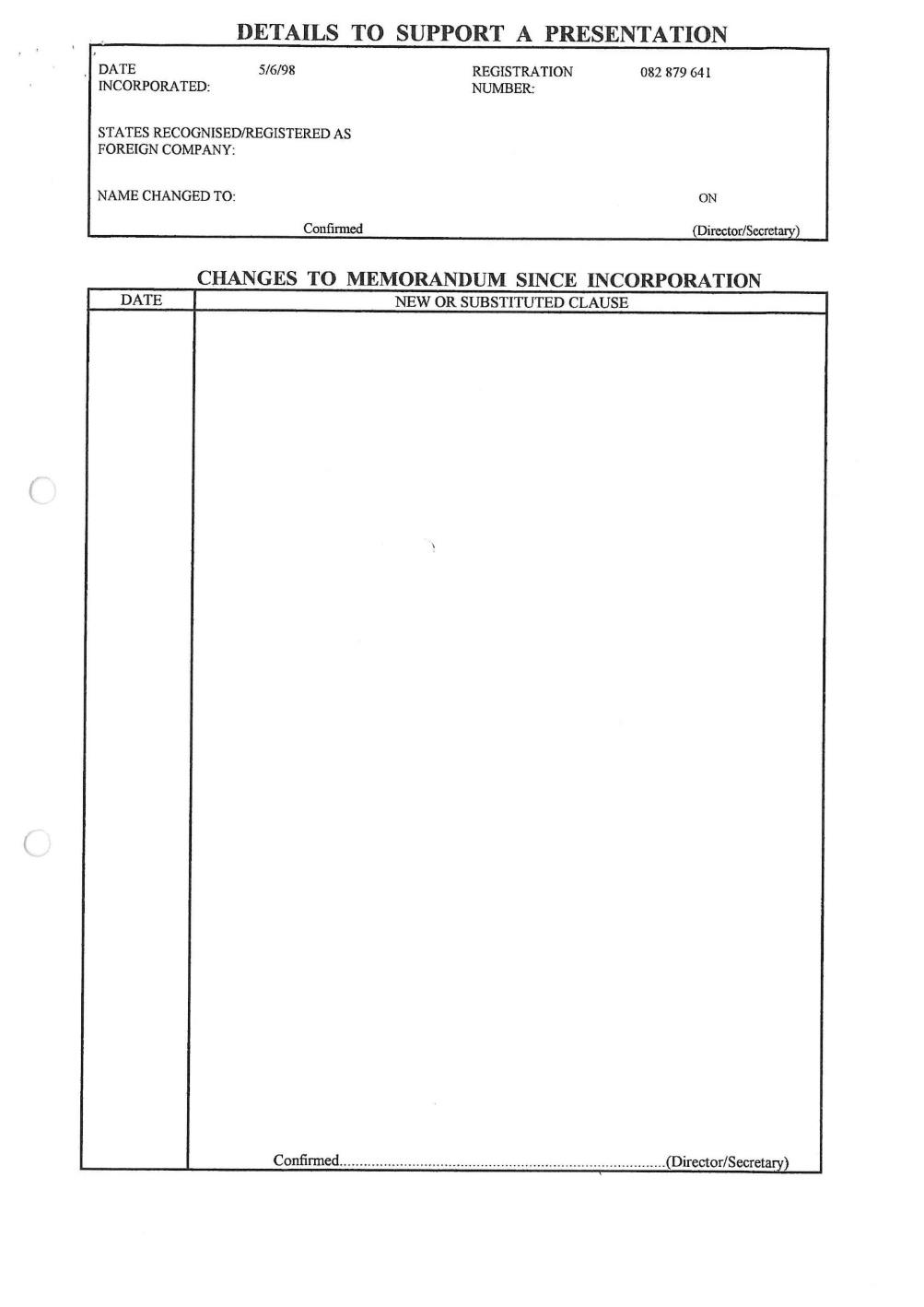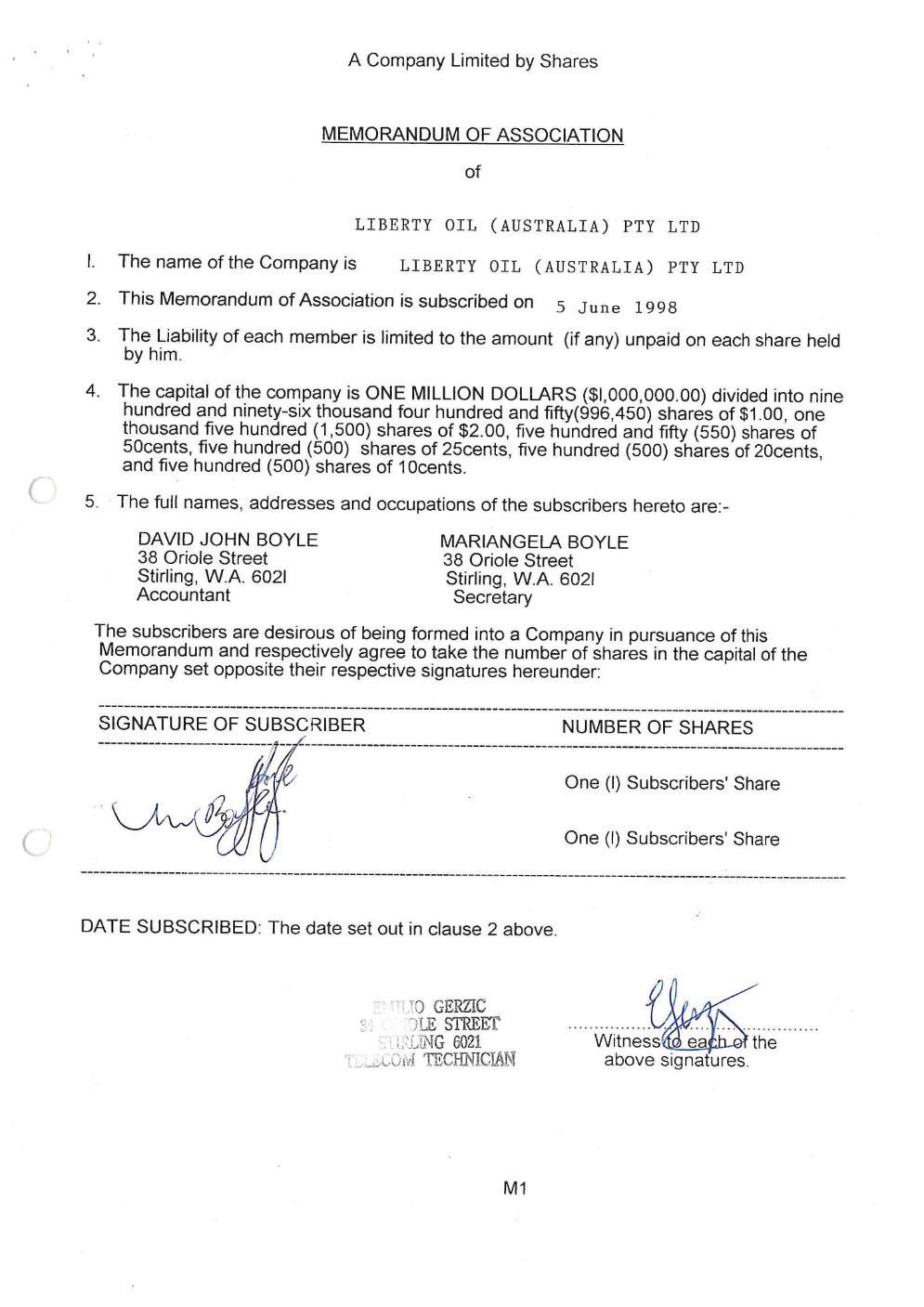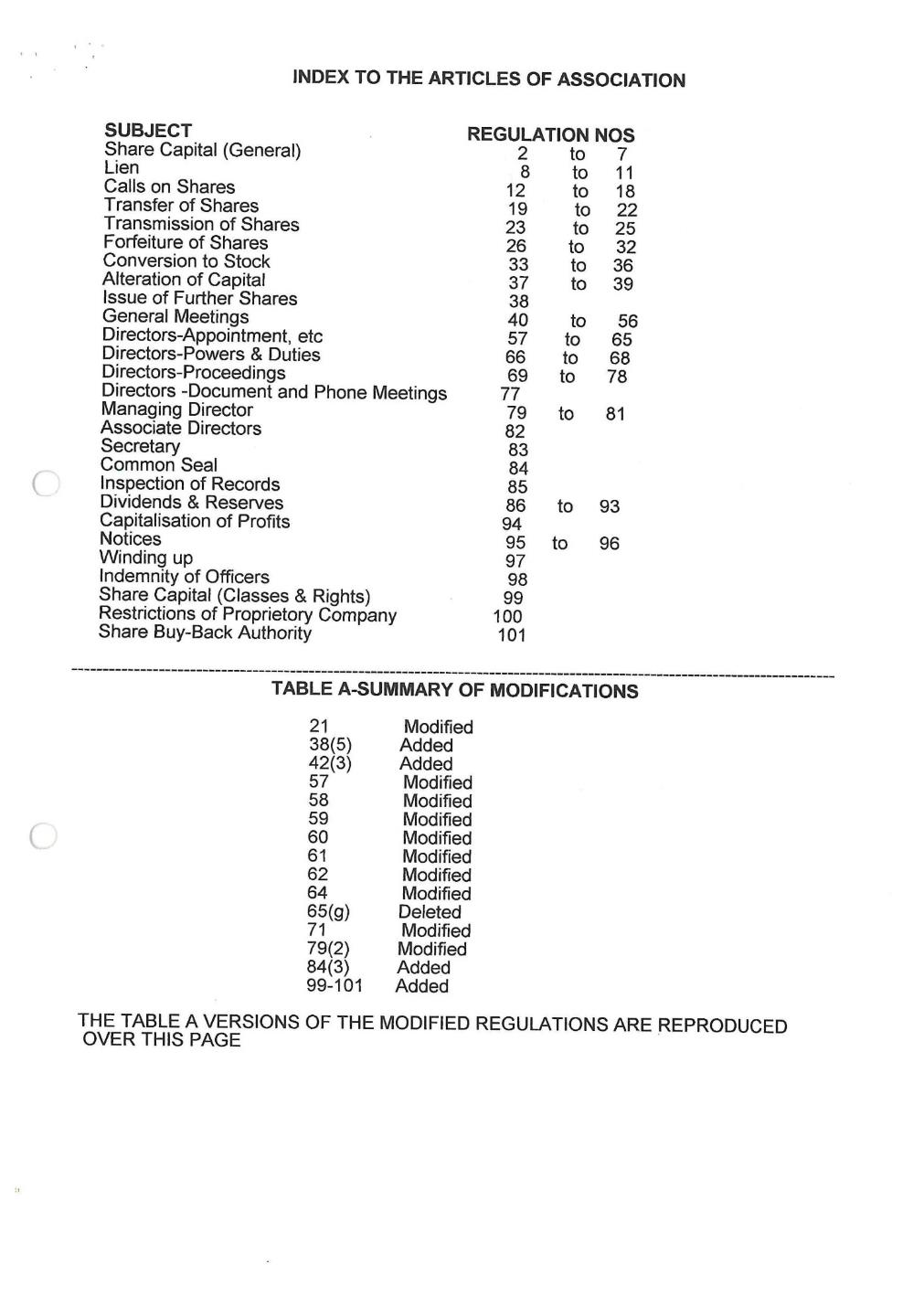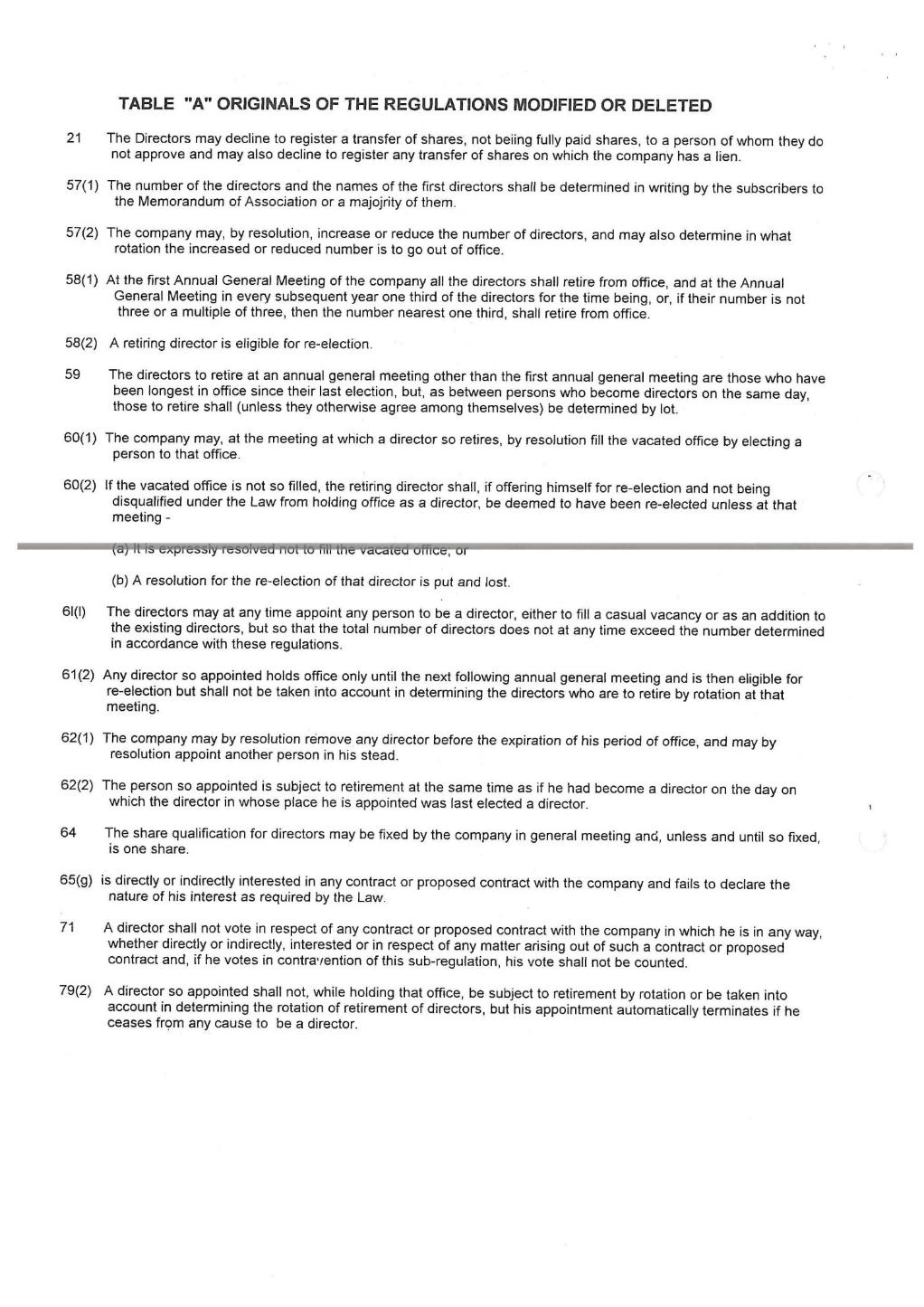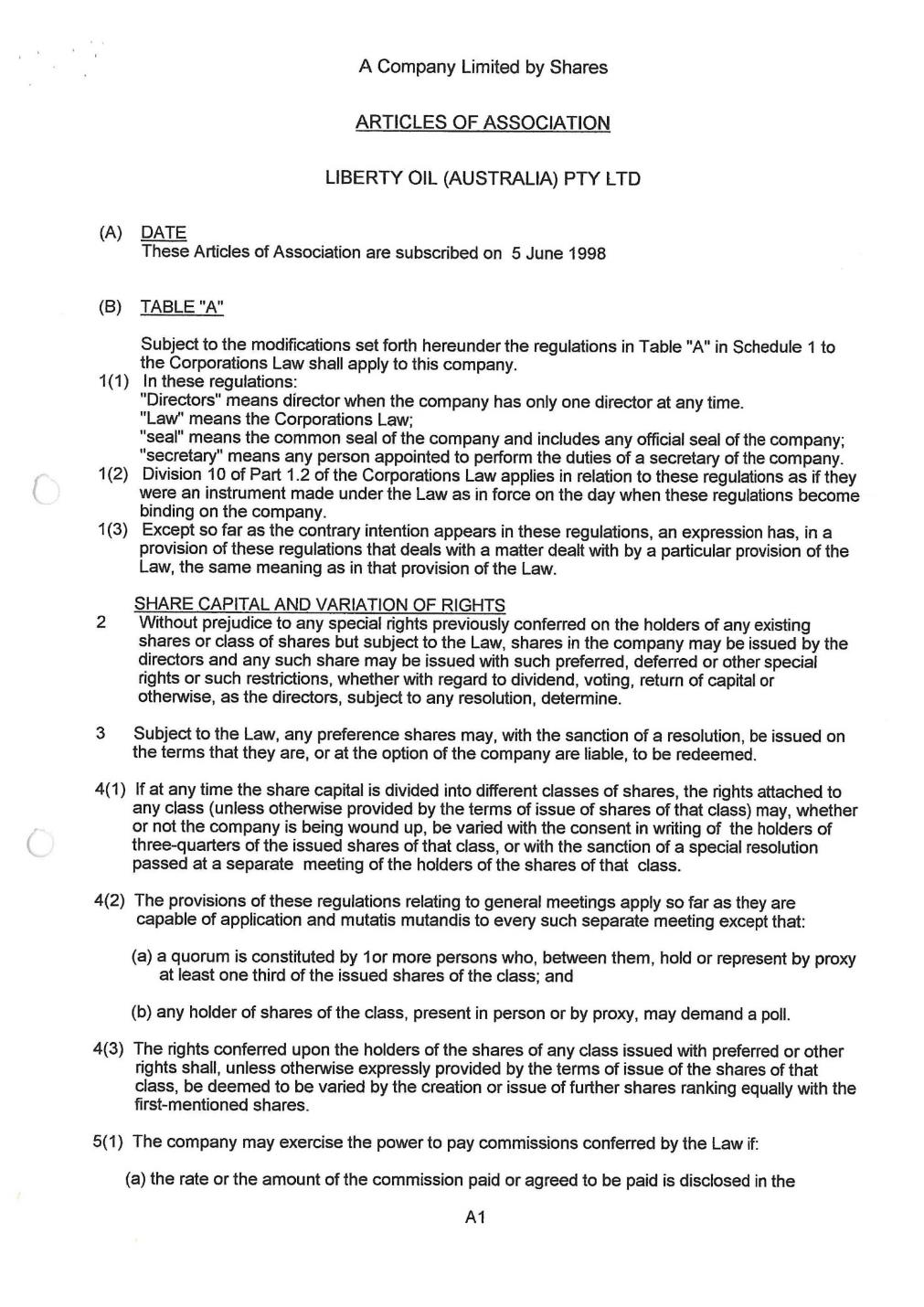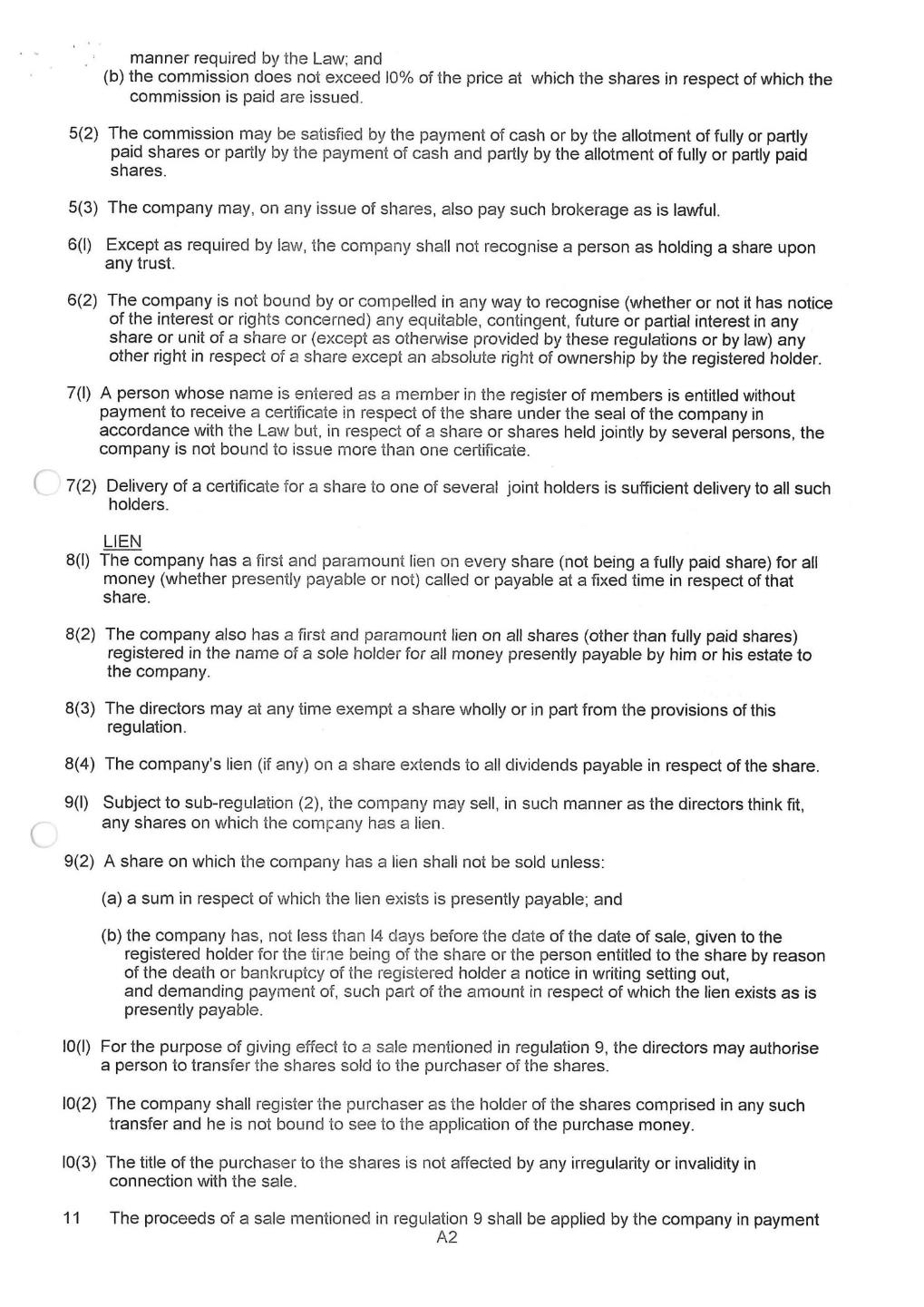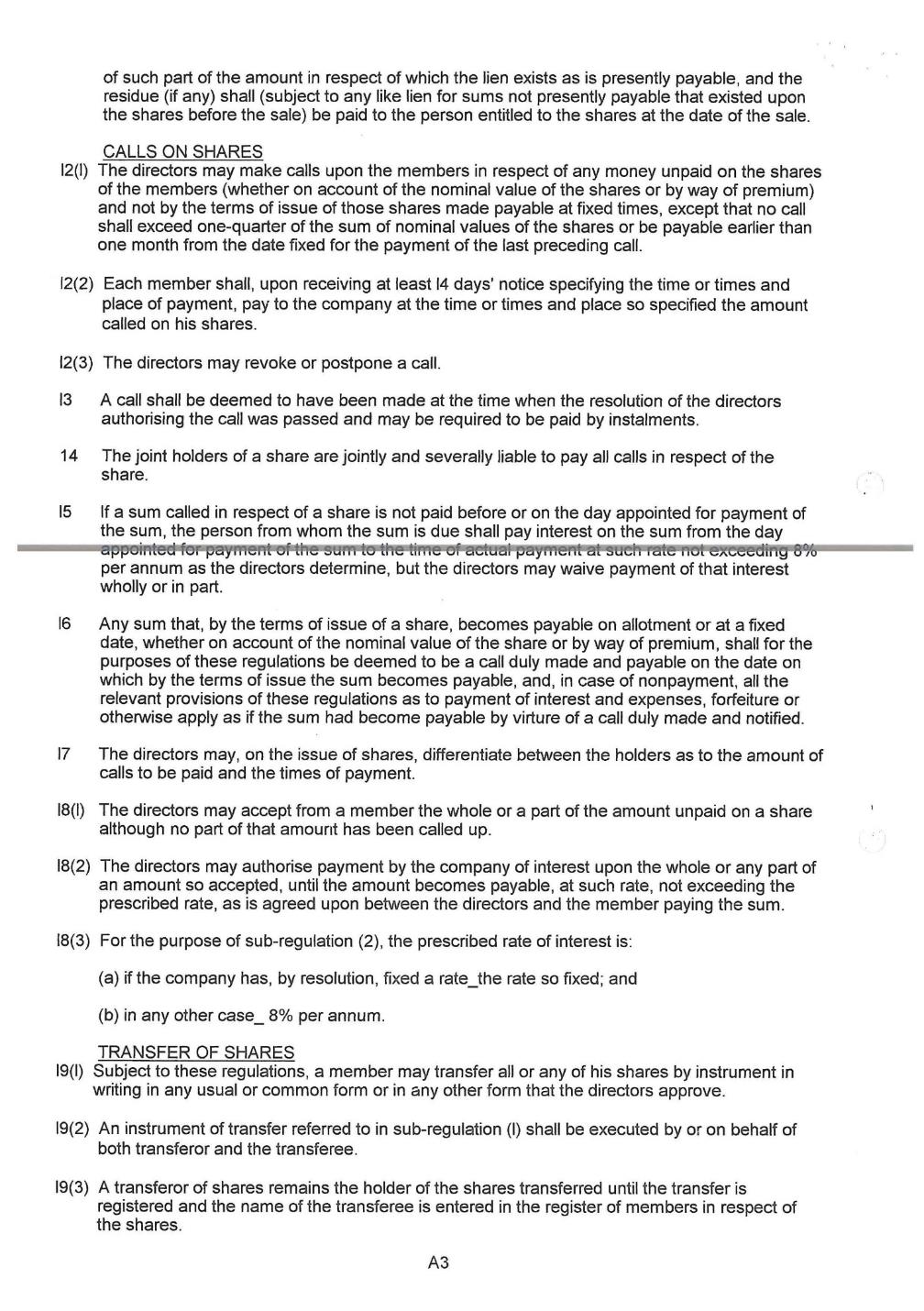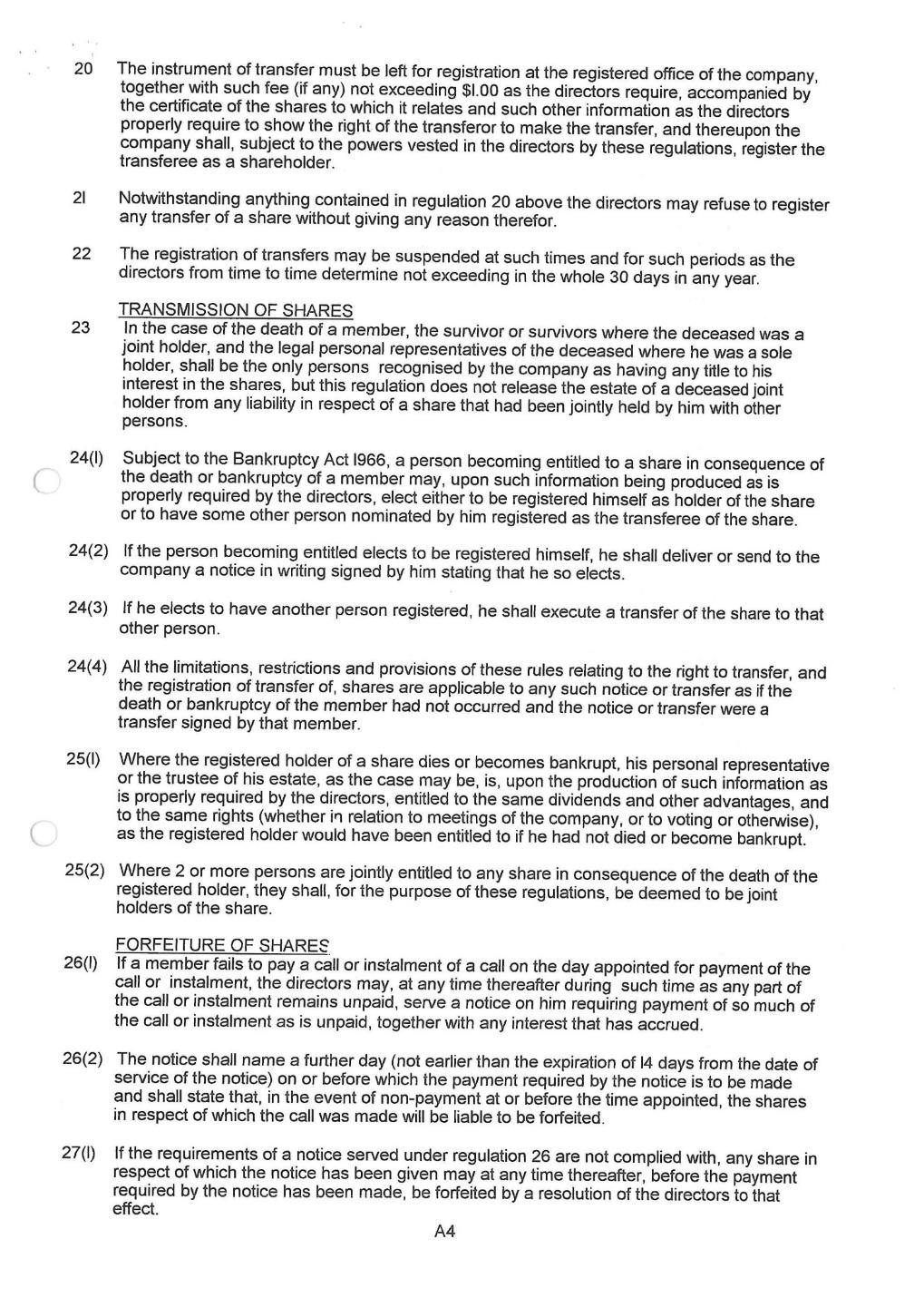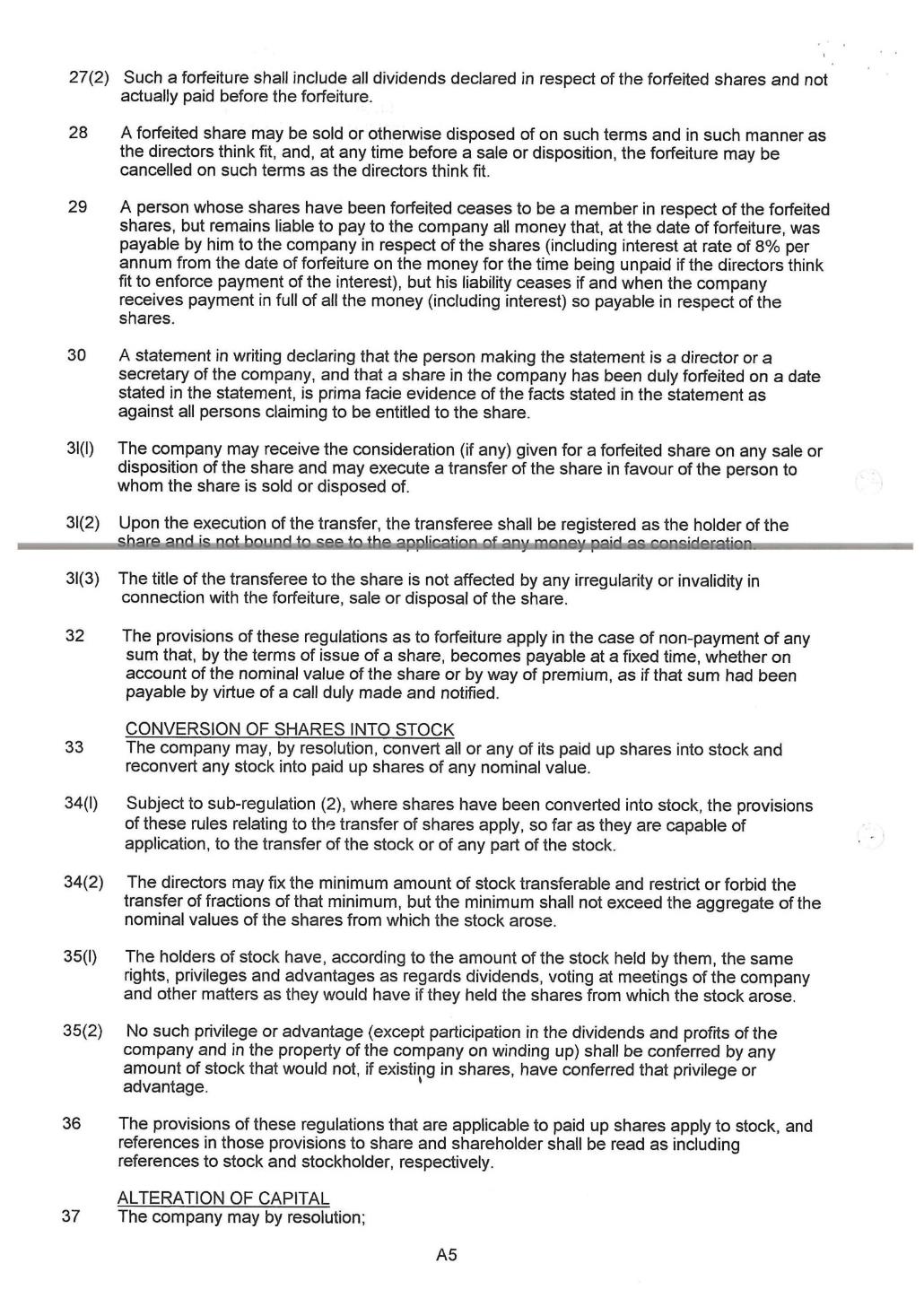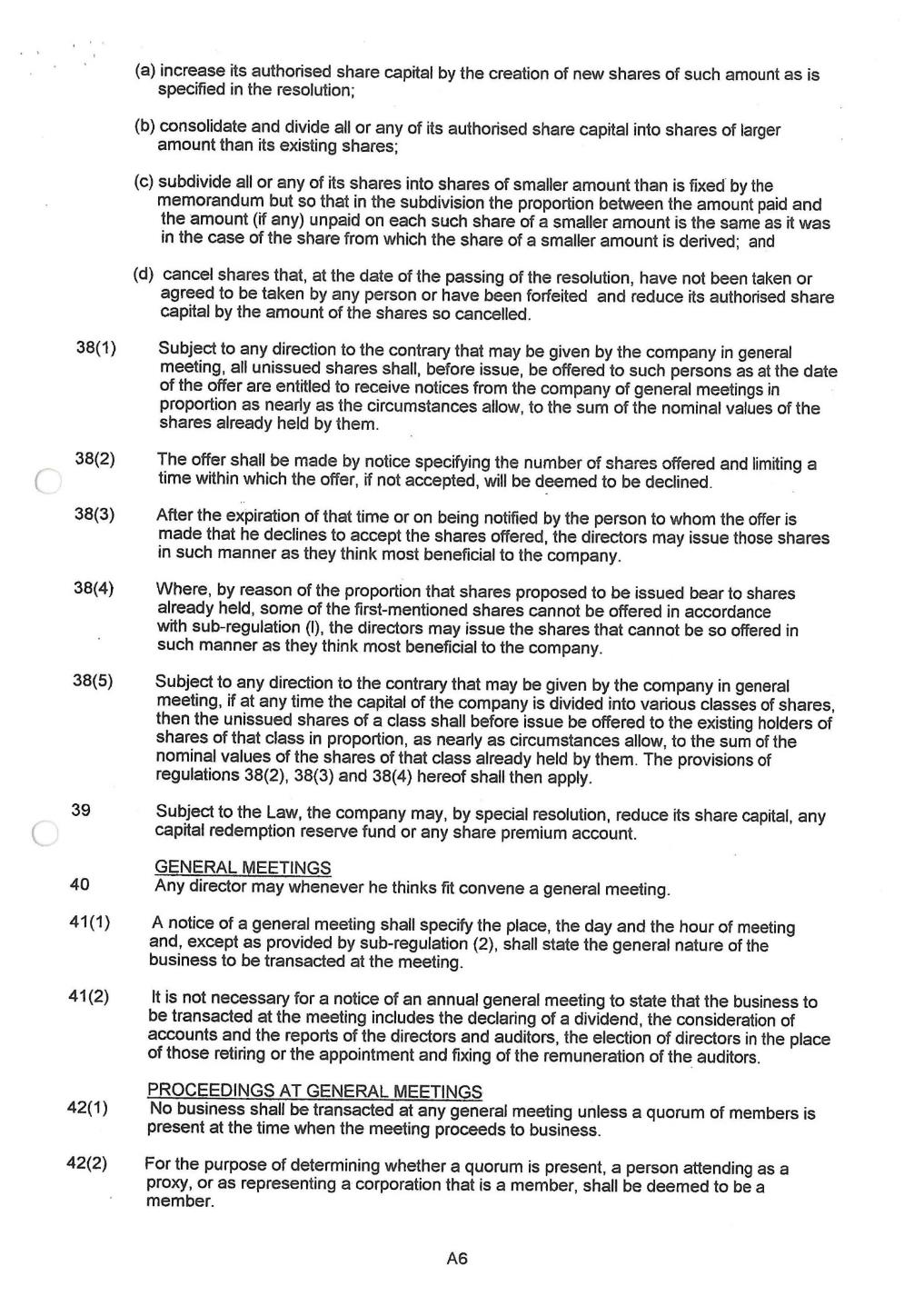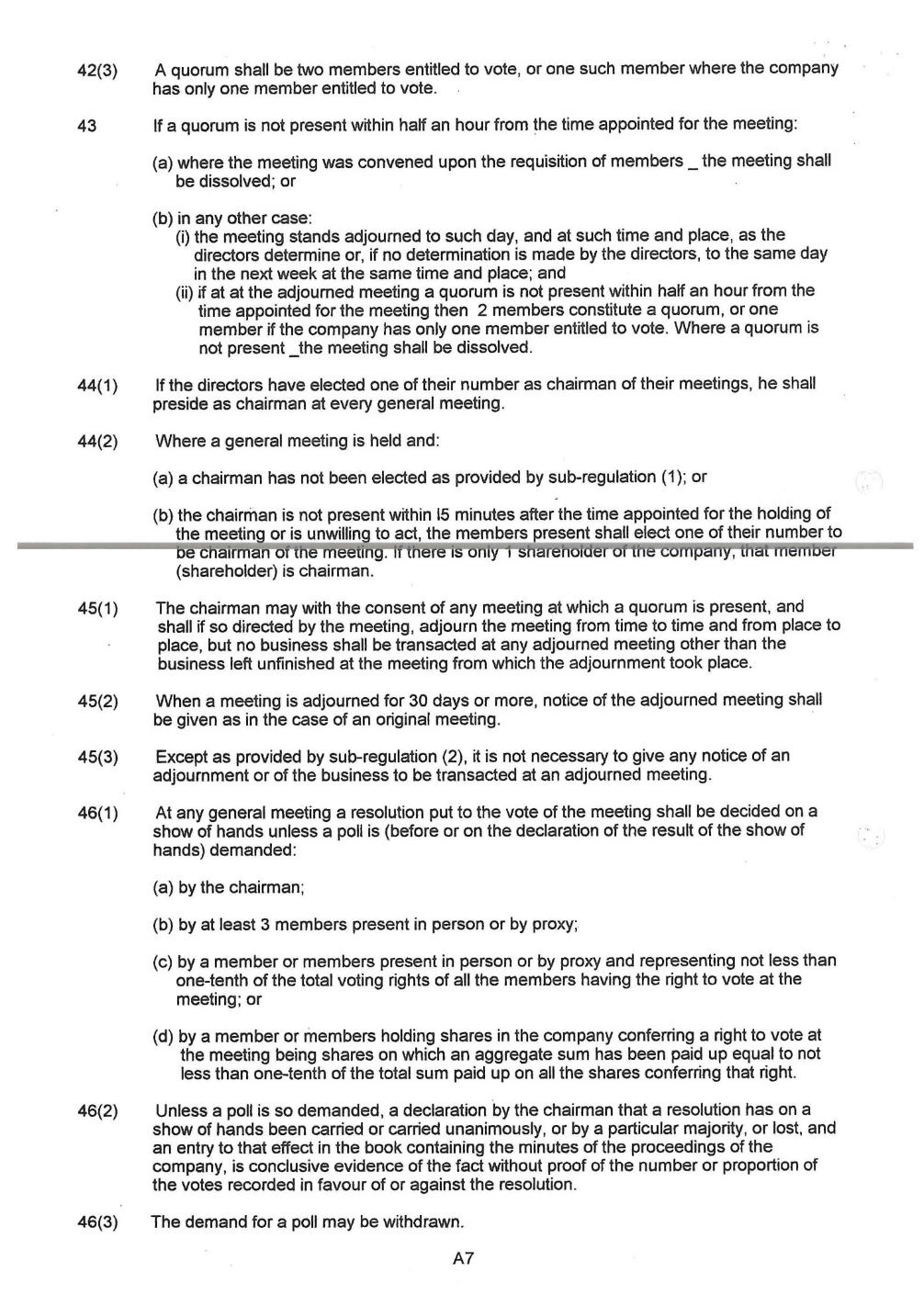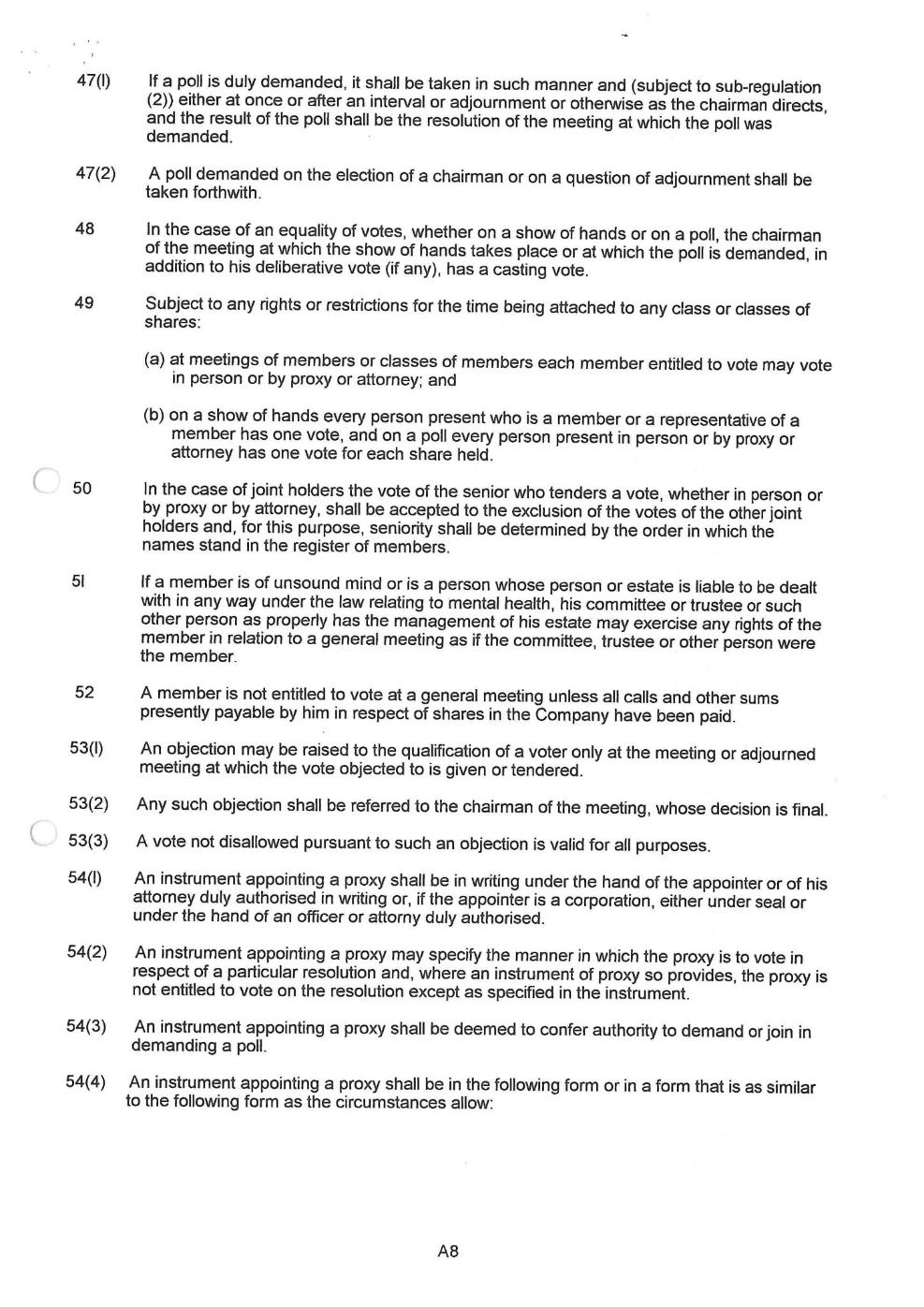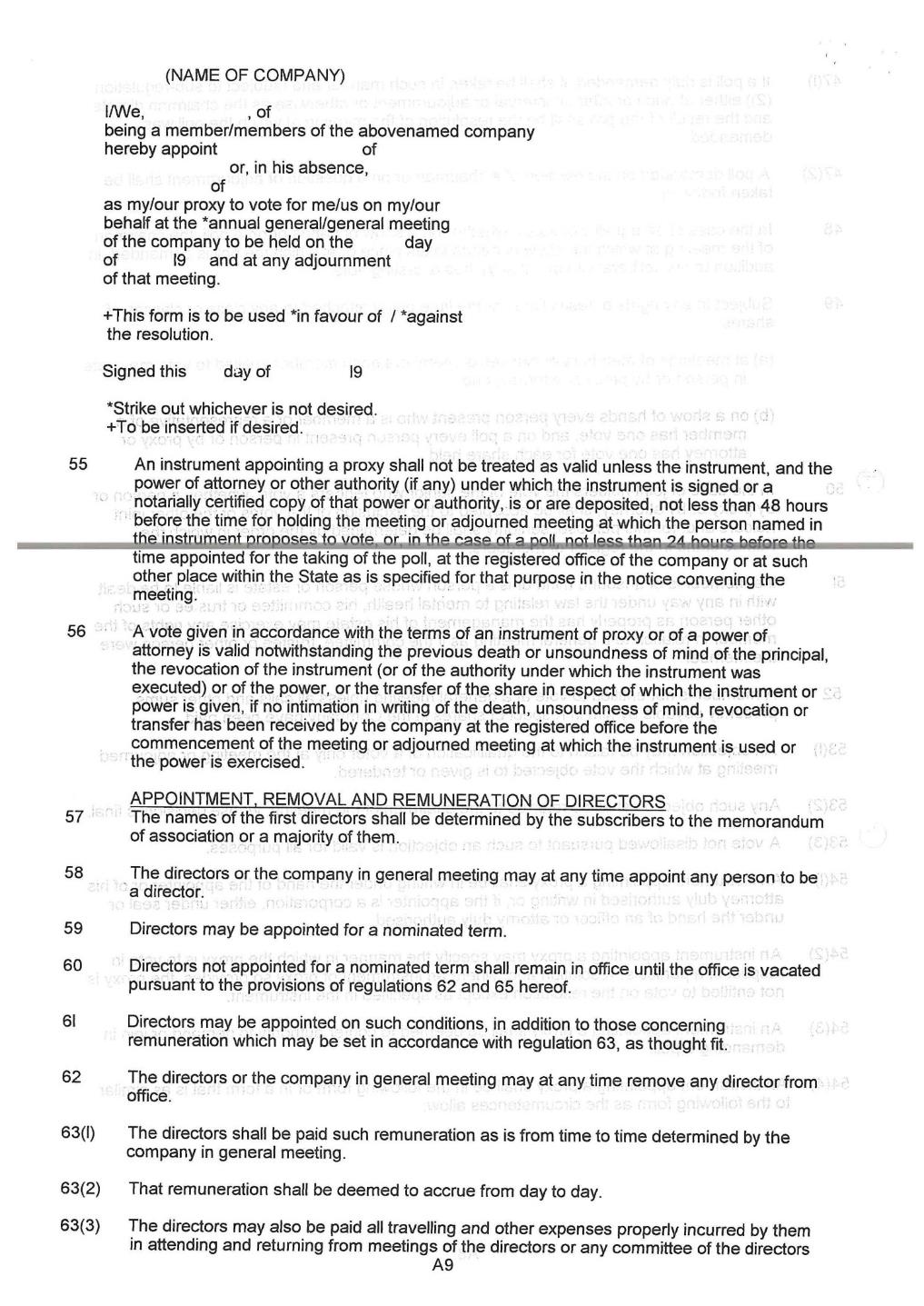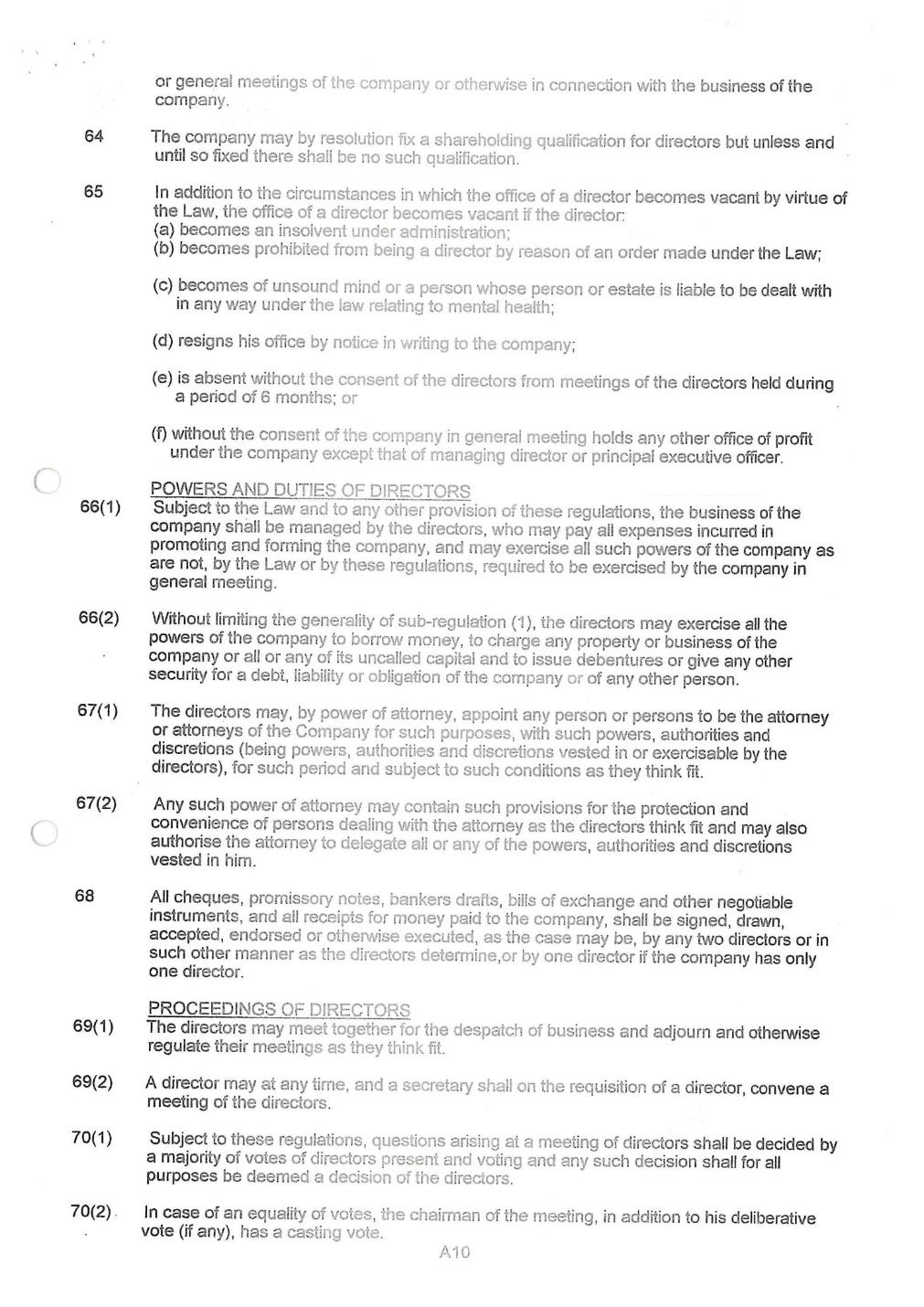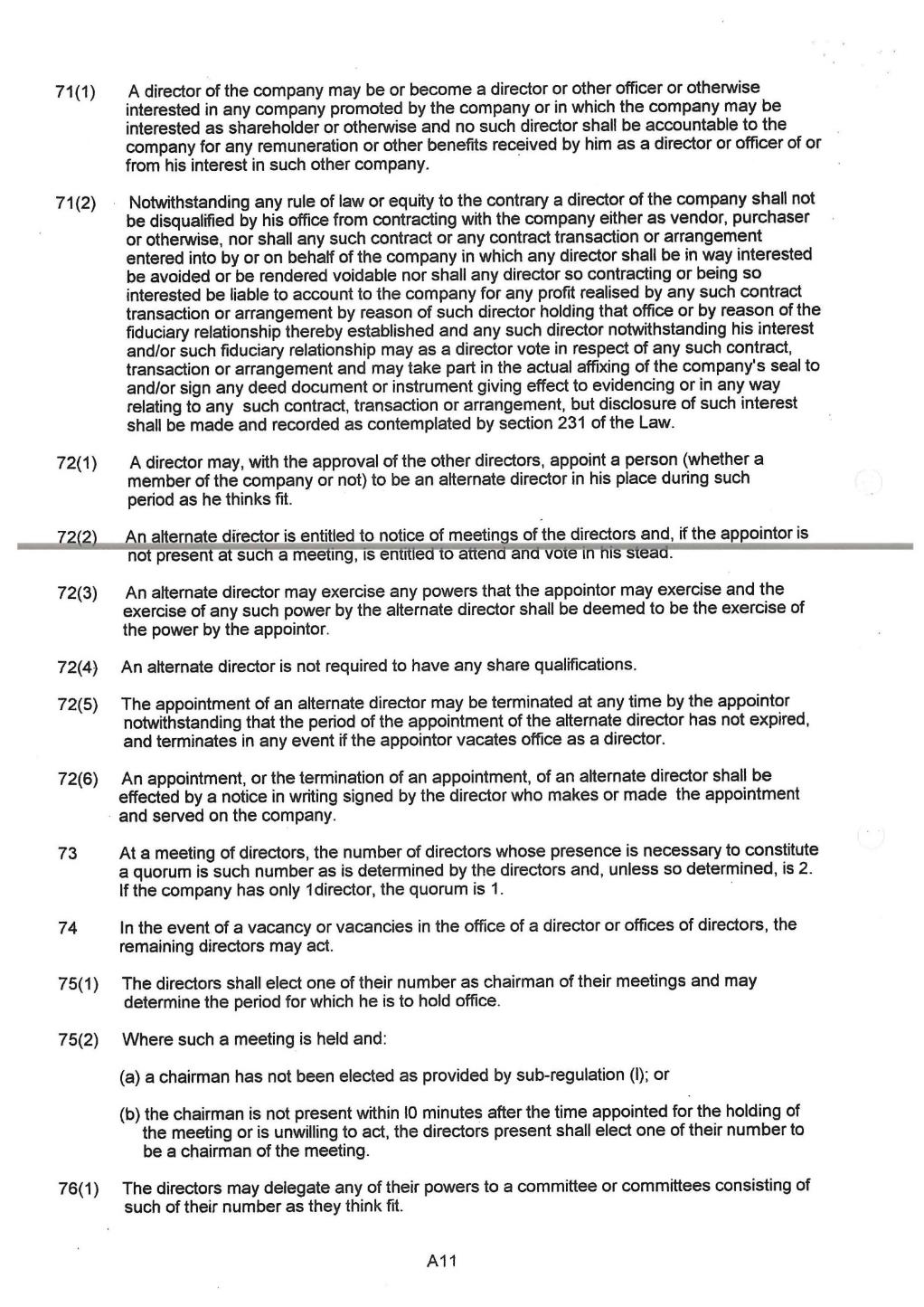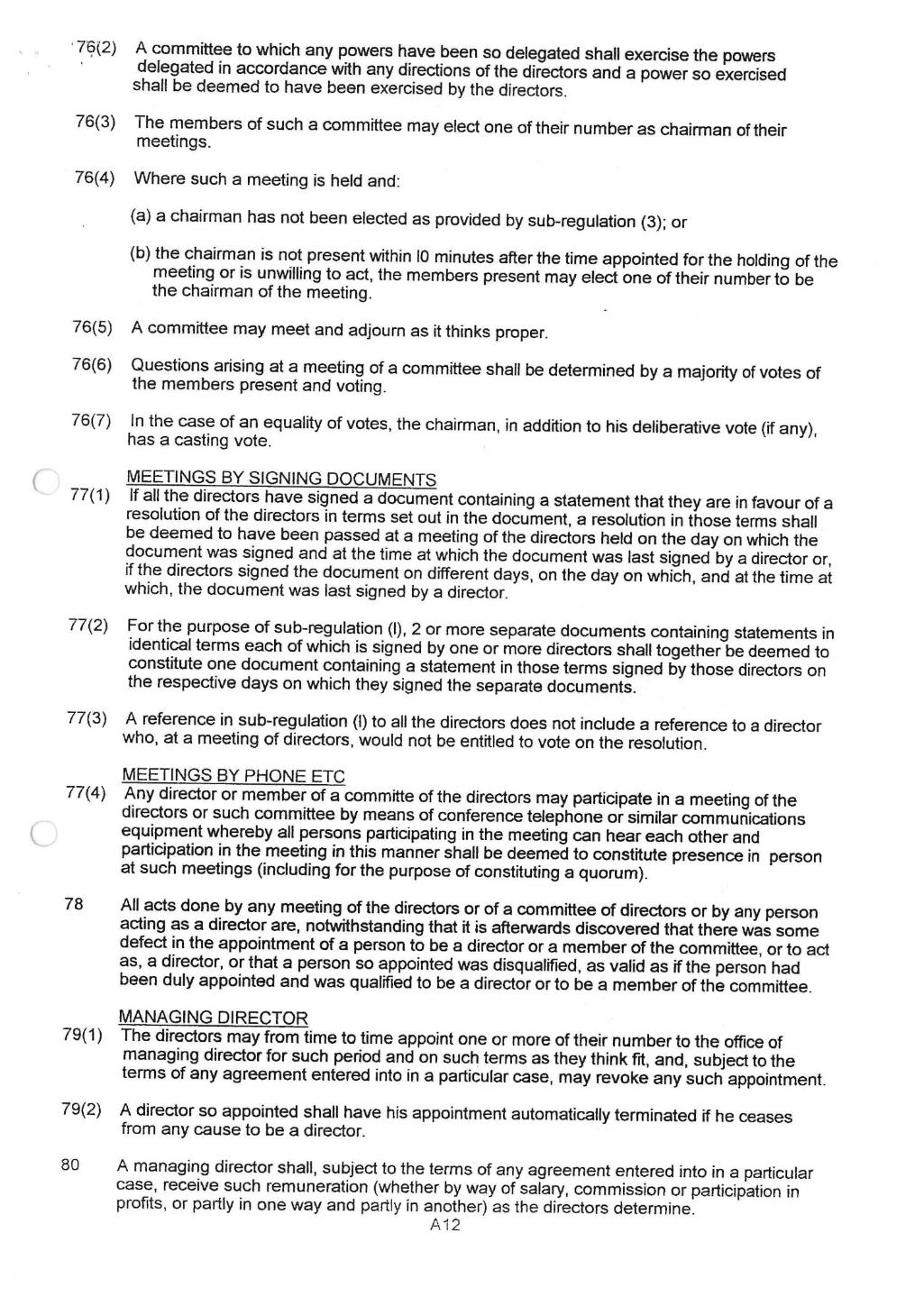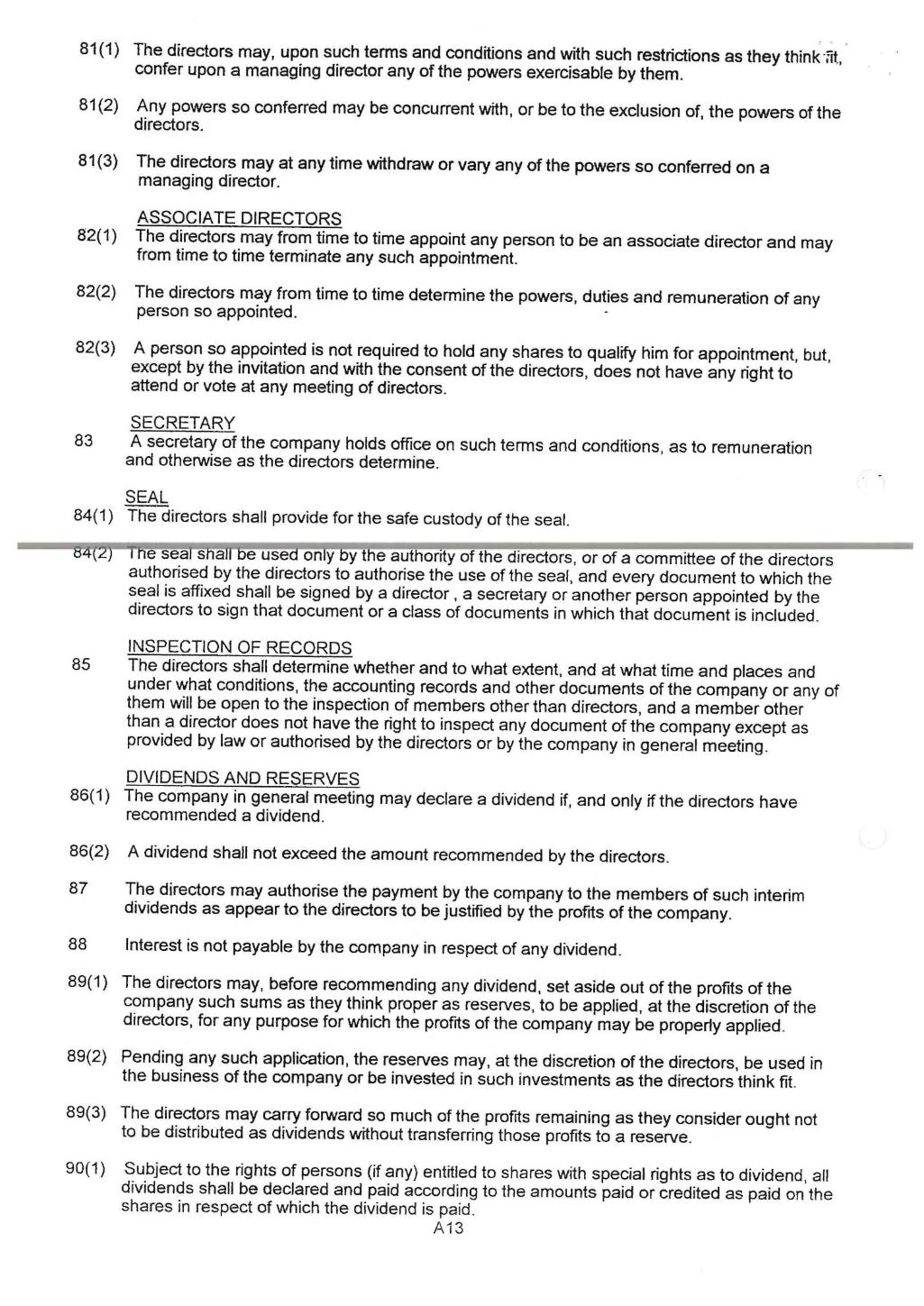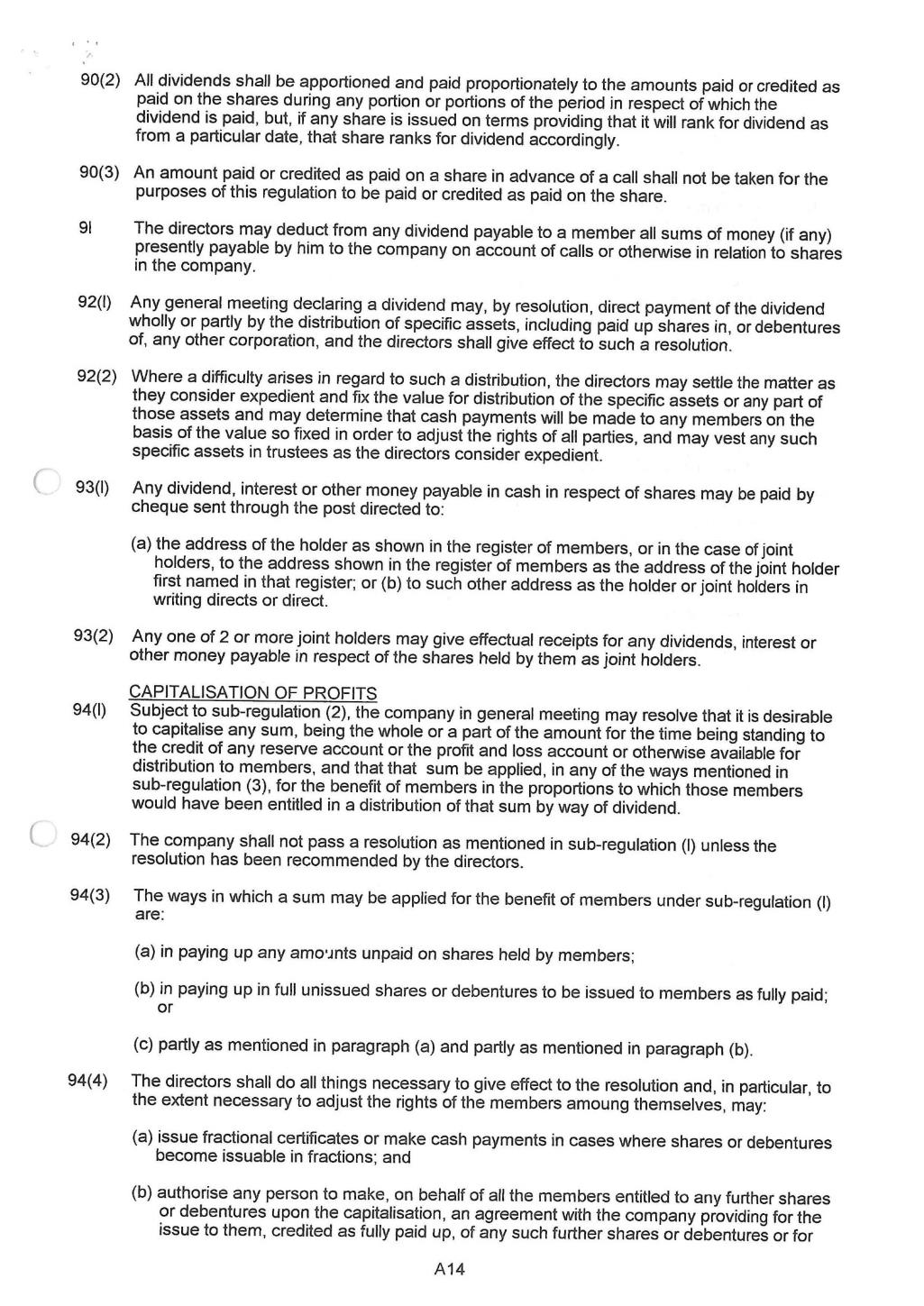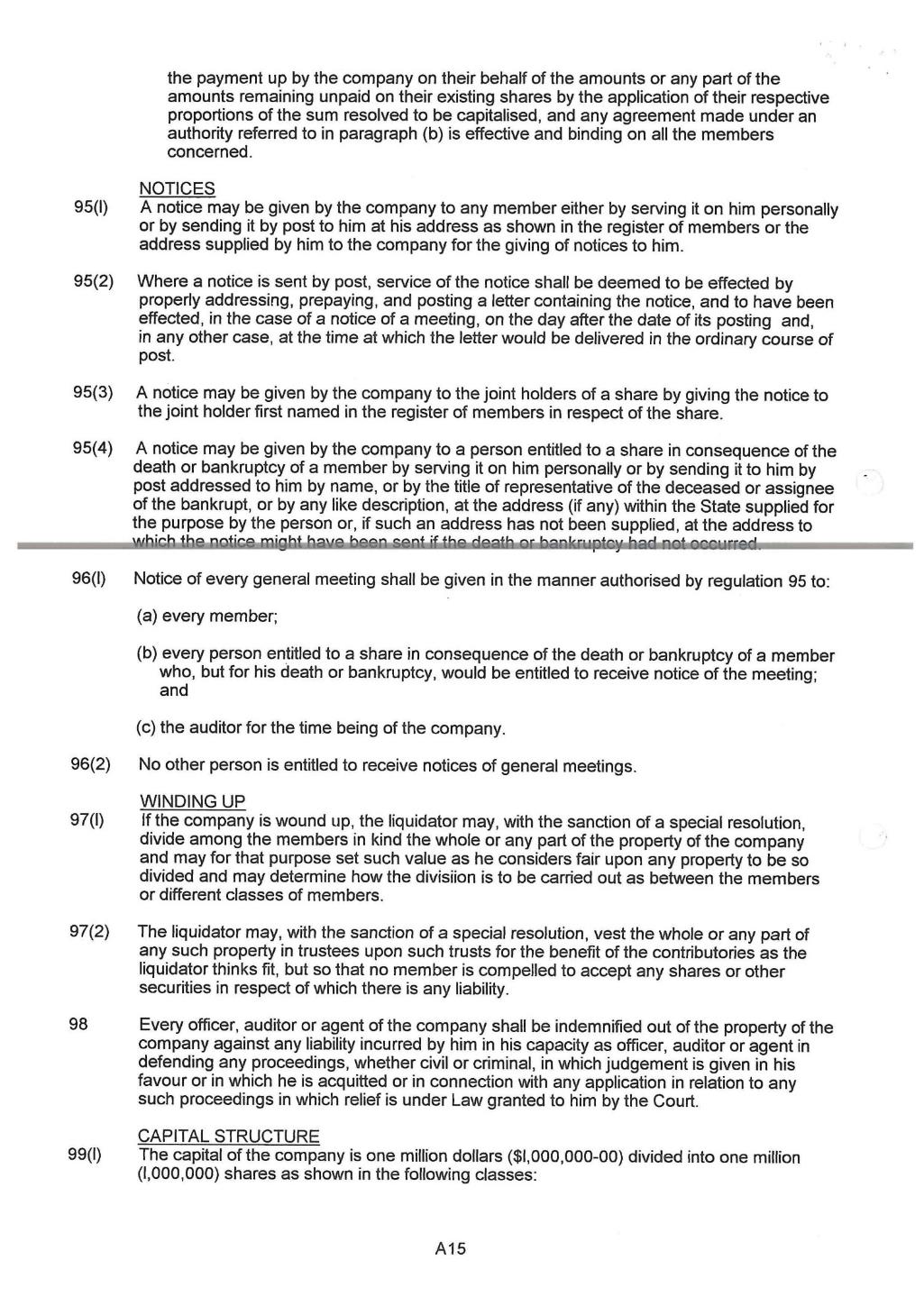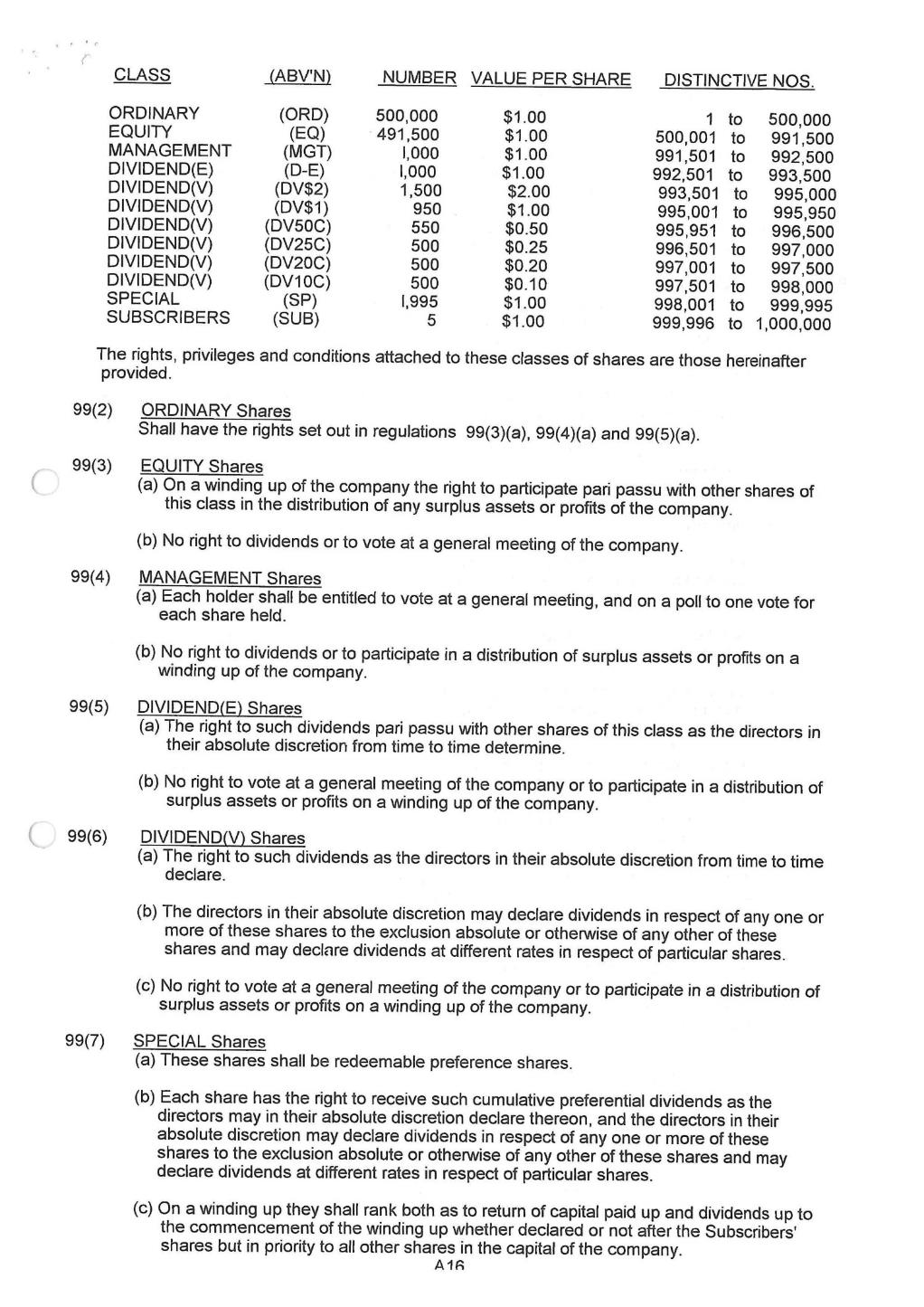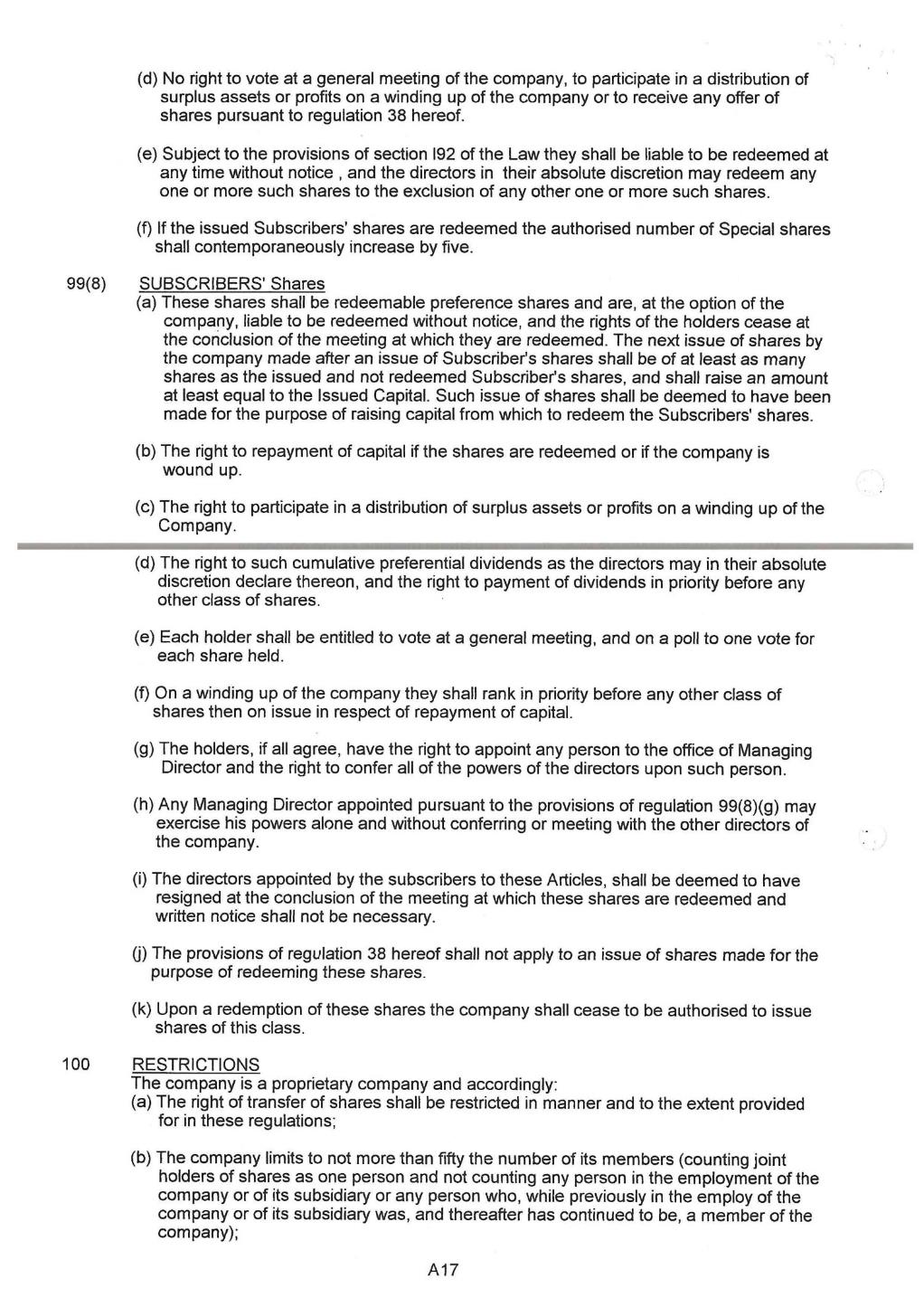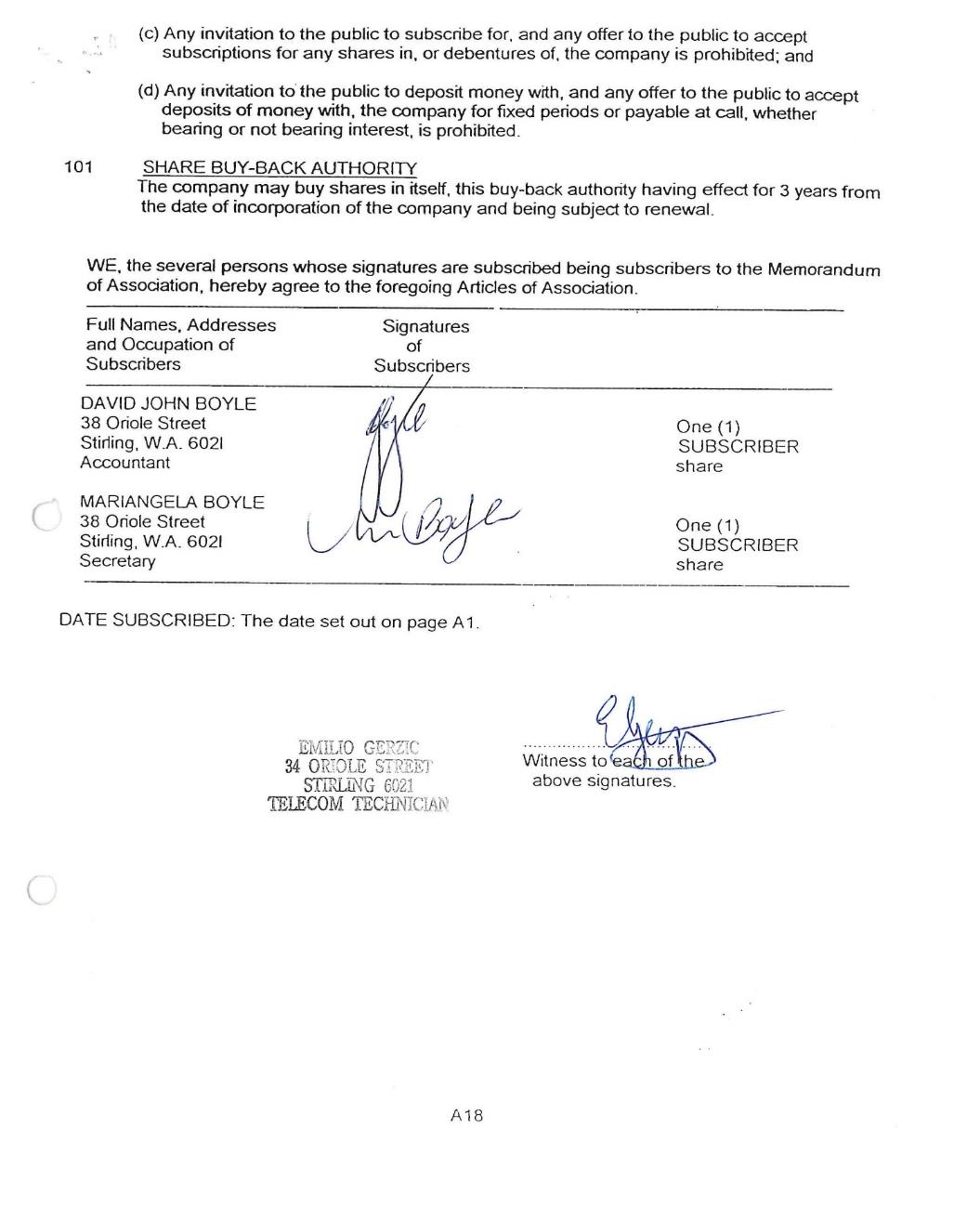FEDERAL COURT OF AUSTRALIA
Frigger v Professional Services of Australia Pty Ltd (No 3) [2023] FCA 520
ORDERS
First Plaintiff ANGELA CECILIA THERESA FRIGGER Second Plaintiff | ||
AND: | PROFESSIONAL SERVICES OF AUSTRALIA PTY LTD (ACN 082 879 641) First Defendant SANDRA MAY BANNING Second Defendant | |
DATE OF ORDER: |
THE COURT ORDERS THAT:
1. Upon the facts set out in the statement of agreed facts, annexed to this order and marked “A” and upon the facts and matters set out in the statement of assumed facts annexed to this order and marked “B”, the following questions arising in the proceeding be heard separately from all other questions in the proceedings:
(1) Was the registration of the company with the name Liberty Oil (Australia) Pty Ltd and Australian Company Number 082 879 641 invalid ab initio?
(2) On the proper construction of section 1322(4)(b) of the Corporations Act 2001 (Cth), has the Court power, on the application of the plaintiffs, to make an order directing the Australian Securities and Investments Commission to rectify the register kept by ASIC under the Corporations Act to remove Professional Services Australian Pty Ltd (ACN 082 879 641) from that register?
(3) If the answer to question (2) is in the affirmative, has the Court power to make such an order with retrospective effect?
2. The continuation of the final hearing listed for 28 to 30 June 2023 be vacated and the determination of the separate questions be listed for hearing on 28 June 2023 at 10.15am (AWST).
3. By 7 June 2023, the plaintiffs are to file and serve any further submissions on the separate questions (limited to 10 pages).
4. By 14 June 2023, the defendants are to file and serve any further submissions on the separate questions (limited to 10 pages).
5. By 21 June 2023, the plaintiffs are to file and serve any submissions purely in response to any submissions of the defendants filed in accordance with paragraph 4 of these orders (limited to 5 pages).
Note: Entry of orders is dealt with in Rule 39.32 of the Federal Court Rules 2011.
FEUTRILL J:
1 These reasons concern orders the Court made on 23 May 2023, on its own initiative, for the trial of separate questions in the proceedings.
2 Rule 30.01 of the Federal Court Rules 2011 (Cth) provides that a party may apply to the Court for an order that a question arising in the proceeding be heard separately from any other questions. Further, the application must be made before a date is fixed for trial of the proceeding.
3 Rule 1.32 of the Rules provides that the Court may make any order that the Court considers appropriate in the interests of justice. Rule 1.34 provides that the Court may dispense with compliance with any of the rules, either before after the occasion for compliance arises. Rule 1.35 provides that the Court may make an order that is inconsistent with the rules and that, in that event, the order of the Court will prevail. Rule 1.40 provides that the Court may, at any stage of the proceeding, exercise a power mentioned in the rules in the proceeding on its own initiative.
4 Section 37M of the Federal Court of Australia Act 1976 (Cth) provides that the overarching purpose of the civil practice and procedure provisions is to facilitate the just resolution of disputes according to law and as quickly, inexpensively and efficiently as possible. The civil practice and procedure provisions must be interpreted and applied, and any power conferred or duty imposed by them must be exercised or carried out, in the way that best promotes the overarching purpose. The civil practice and procedure provisions include the rules of the Court made under the Federal Court Act. Section 37P provides that the court or a judge may give directions about the practice and procedure to be followed in relation to the proceeding, or any part of the proceeding.
5 In AWB Ltd v Cole (No 2) [2006] FCA 913; 233 ALR 453 at [26]-[40], Young J reviewed the authorities concerning O 29 r 2(a) of the Federal Court Rules (the predecessor to rule 30.01) which provided that the court may make orders for the decision of any question separately from any other question, whether before, at, or after any other trial. In City of Swan v Lehman Brothers Australia Ltd [2009] FCA 784; (2009) 73 ACSR 86, Rares J at [27] in turn summarised the principles extracted from the relevant authorities to which Young J made reference Cole (No 2) as follows:
(1) As a general rule the starting point is that all issues of fact and law should be determined at the one time.
(2) A party seeking the determination of separate questions must satisfy the court that it is "just and convenient" for the order to be made. The order must be made on concrete facts, either established or agreed, for the purpose of quelling a controversy between the parties so as to produce a conclusive or final judicial decision on the issue, which is of a real, not hypothetical, importance to the determination of the controversy.
(3) There are special problems where the separate issue involves a mixed question of fact and law, although it may still be able to be decided as a separate issue. However, care must be taken in precisely formulating the question and specifying the facts upon which it is to be decided.
(4) The court must have all relevant matters before it as a precondition of it being asked to exercise its discretion if the separate question involves the grant or refusal of declaratory relief.
(5) It may still be appropriate to determine a separate question even if it will not resolve all the issues, provided that there is a strong prospect that the parties will agree upon the result when the core of the dispute has been decided or if the decision will obviate unnecessary and expensive hearings of other questions.
(6) Generally speaking an issue will not be appropriate for separate determination if it is simply one of two or more alternative ways in which an applicant or plaintiff frames its case and its determination would leave other significant issues unresolved.
(7) It is relevant to consider whether:
• the separate questions will contribute to the saving of time and cost by substantially narrowing the issues for trial or even lead to the disposal of the proceedings;
• they will contribute to the settlement of the proceedings;
• they will give rise to significant contested factual issues both at the time of the hearing of the preliminary question and at the time of the trial;
• there will be any significant overlap between the evidence adduced on the hearing of the separate question and a trial;
• the questions will prolong, rather than shorten, the proceedings.
6 The court should approach the separate trial of issues with caution. In Tepko Pty Ltd v Water Board [2001] HCA 19; (2001) 206 CLR 1 Kirby and Callinan JJ said:
The attractions of trials of issues rather than of cases in their totality, are often more chimerical than real. Common experience demonstrates that savings in time and expense are often illusory, particularly when the parties have, as here, had the necessity of making full preparation in the factual matters relevant to one issue are relevant to others, and they all overlap.
The second and related comment is this. A party whose whole case is knocked out on a trial of a preliminary or single issue, may suspect, however unjustifiably, that an abbreviated course was adopted and a decision reached in the courts, rather than the parties', interests.
Thirdly, there is an additional potential for further appeals to which the course of the trial on separate issues may give rise. Indeed, that could occur here were this appeal to be allowed and a retrial had in which the remaining issues of causation and damages were decided. Single-issue trials should, in our opinion, only be embarked upon when their utility, economy, and fairness to the parties are beyond question [168].
7 On 12 October 2022 and 10 February 2023, the Court made pre-trial orders for the exchange of evidence and submissions before trial. Further, the plaintiffs’ originating application was listed for final hearing for two days on 2 and 3 March 2023. In the meantime, the defendant applied for security for their costs and on 9 December 2022 the Court made orders to the effect that the plaintiffs provide $35,000 in security for the defendants’ costs of the proceedings and the defendants were given liberty to apply for further security.
8 The plaintiffs provided security for costs in accordance with the Court’s order of 9 December 2022. Thereafter, the defendants did not apply for further security for their costs and the final hearing of the originating application commenced on 2 March 2023. On 3 March 2023, the final hearing was adjourned part heard and was re-listed for a further two days on 28 and 29 June 2023.
9 On 7 March 2023, the plaintiffs filed an interlocutory application for leave to adduce evidence from Mr Michael David Maran, a handwriting expert, at the resumption of the final hearing. On 24 April 2023, the Court made orders permitting the plaintiffs to adduce expert handwriting evidence at the resumption of the trial on certain conditions that included that Mr David John Boyle, a person who had given evidence on 2 and 3 March 2023, be recalled for further cross-examination. The Court also granted the plaintiffs leave to cross-examine Mr Boyle in re-examination on the grounds that Mr Boyle was an ‘unfavourable witness’ and may have made a prior inconsistent statement about certain matters upon which he was cross-examined: see, ss 38, 39 and 129 of the Evidence Act 1995 (Cth). The Court also made orders to facilitate the defendant adducing their own expert handwriting evidence at the resumption of the final hearing. The Court also extended the final hearing to three further days.
10 On 26 April 2023, the plaintiffs requested leave to issue a subpoena to a further witness, Mr John Andrew Miller, to give oral evidence at the resumption of the final hearing. Leave has not yet been granted to issue that subpoena and, at a case management hearing held on 19 May 2023, the defendants indicated, through their counsel, that any application for leave to adduce oral evidence from Mr Miller would be opposed. The question of whether leave should be granted to issue a subpoena Mr Miller will have to be resolved before 28 June 2023. If leave to issue the subpoena is granted, the question of whether leave should be granted to allow the plaintiffs to adduce oral evidence from him, if not also resolved before 28 June 2023, will be a matter that will have to be resolved at the resumption of the final hearing.
11 It is evident from the materials filed in the Court that Mr Maran resides in New Zealand. It is evident from communications with the Court, that the plaintiffs intend, in due course, to file an interlocutory application for orders under ss 47A(1) and 47C of the Federal Court Act to have the evidence of Mr Maran given from New Zealand via video link. The defendants have indicated, through their counsel, that any application to have the evidence of Mr Maran given remotely will be opposed. If not resolved before 28 June 2023, the manner in which Mr Maran is to give evidence, if at all, at the resumption of the final hearing is another matter that will have to be resolved at the final hearing.
12 On 1 May 2023, the defendants applied for an order that the plaintiffs provide further security for costs. The plaintiffs have indicated that they will oppose any order that they provide further security.
13 It is manifest from the matters described above that the Court’s and the parties’ time and resources will be consumed before 28 June 2023 and (or) during the resumption of the final hearing dealing with a number of outstanding interlocutory disputes between the parties. It is also evident that the plaintiffs intend to call at least one further additional witness and, possibly, expand the factual issues for determination at the final hearing. Based on these matters and having regard to the manner in which the parties conducted the hearing on 2 and 3 March 2023, the Court is not confident that the hearing will be completed in the further three days allocated. Further, even if it is completed in the three further days, additional time and resources will be taken up in the meantime dealing with the plaintiffs’ applications concerning additional evidence and the mode of Mr Maran’s evidence.
14 As part of the pre-trial orders made on 10 February 2022, the parties were each required to file a statement of the issues to be determined in the proceedings. Although the parties expressed the issues in slightly different terms, it is possible to distil common legal questions from the issues the parties identified which could be determined separately on the assumption that the plaintiffs prove all the facts upon which the relief they seek in the proceedings is founded. Therefore, determining those legal questions separately has the potential to dispose of the proceedings or substantially narrow the remaining issues for determination. Accordingly, the Court listed the proceedings for a case management hearing on 19 May 2023, in order for the parties to make submissions to the Court on the merits of determining three questions the Court identified as common questions that could be determined separately.
15 The plaintiffs were opposed to any separation of the issues in the proceedings. The plaintiffs submitted that the legal questions are clear and that they are entitled to the relief they seek if they prove the facts upon which their relief is based. The plaintiffs also submitted that it was undesirable to separate the issues after the final hearing had commenced and before the plaintiffs had an opportunity to cross-examine the defendants’ witnesses and complete their evidence in the hearing. In substance, the plaintiffs submitted that the general position that all issues in proceedings should be determined at the one time should not be disturbed in circumstances where the final hearing had commenced and the matter was listed for completion on 28 to 30 June 2023. The plaintiffs submitted, in substance, that the interests of justice would be better served by resolving all issues at one time and that would be the more expeditious and efficient use of the Court’s and parties’ resources.
16 The defendants were in favour of the determination of separate questions. The defendants submitted, in substance, that if the legal questions were answered unfavourably to the plaintiffs it would bring an end to the proceedings without the defendants incurring the costs of engaging an expert witness, participating in three, or more, further days of trial, and preparation for and appearances on various interlocutory disputes in the meantime.
17 At the case management hearing the parties also confirmed that certain facts were agreed. The separate questions can be determined on the agreed facts and on the assumption that the plaintiffs prove or demonstrate certain of the other facts and matters that are in issue in the proceedings. Therefore, determination of the separate questions on the agreed and assumed facts and matters is in the nature of resolving a demurrer plea.
18 There is force in the submissions of both the plaintiffs and the defendants. The matter is finely balanced particularly in circumstances in which the final hearing has commenced and has been adjourned part heard and relisted for continuation on dates fixed in June. Nonetheless, as noted earlier, the Court is not confident that the final hearing will be completed in the three days allocated for that hearing. Further, the Court’s resources and the parties’ resources will be consumed by a number of interlocutory disputes before and (or) at the resumption of the final hearing. The time and costs of dealing with those disputes will be reduced if separate questions are ordered and determination of those questions disposes of the proceedings. Even if determination of the separate questions does not result in disposal of the proceedings, it will narrow the remaining issues for the final hearing and may encourage the parties to resolve some or all of the remaining factual issues. In these circumstances, although finely balanced, I am satisfied that the interests of justice favour the determination of the identified separate questions.
I certify that the preceding eighteen (18) numbered paragraphs are a true copy of the Reasons for Judgment of the Honourable Justice Feutrill. |
Associate:
Dated: 24 May 2023
ANNEXURE “A”
STATEMENT OF AGREED FACTS
The parties agree the following facts.
1 On 5 June 1998, a Form 201 application for registration of an Australian company with the proposed name Liberty Oil (Australia) Pty Ltd was lodged with the Australian Securities Commission, a copy of which is annexed hereto, marked “AF1” and is Exhibit 2.1/AF1.
2 Mr David John Boyle prepared and lodged the Form 201 with the ASC and both Mr Boyle and Mrs Mariangela Boyle signed that document before it was lodged.
3 The companies register kept by of the Australian Securities Investments Commission records, amongst other things, the following:
Company registration and name
(a) A company with the name Professional Services of Australia Pty Ltd and Australian Company Number 082 879 641 is registered.
(b) On 5 June 1998, the company was registered in Western Australia.
(c) On 8 June 1998, a certificate of registration for the company was issued.
(d) The former name of the company was Liberty Oil (Australia) Pty Ltd.
(e) On 7 July 1998, notice of a resolution changing company name was given with respect to the company.
(f) On 7 July 1998, the company name on the register was changed to Professional Services of Australia Pty Ltd.
Company officers
(g) On 1 July 1998, notice of initial appointment of officeholders was given with respect to the company.
(h) Mr Boyle and Mrs Boyle were directors of the company from 5 to 8 June 1998.
(i) Mr Martin Paul Banning was a director of the company from 8 June 1998 to 8 September 2008.
(j) Mr John Andrew Miller was a director of the company from 8 to 26 June 1998.
(k) Mrs Sandra May Banning was a director of the company from 26 June 1998 to 4 June 2001.
(l) Mr Donald Campbell-Smith was a director of the company from 8 September 2008 to 10 May 2016.
(m) The company was under administration of an administrator appointed under the Corporations Act 2001 (Cth) between 17 November 2008 and 23 March 2009.
(n) The company was under administration of an administrator appointed under a deed of company arrangement between 23 March 2009 and 6 November 2012.
(o) Mrs Banning is the sole director and secretary of the company and was appointed to those offices on 10 May 2016.
Company shareholders/members
(p) On 11 June 1998, notice of redemption of redeemable preference shares was given with respect to the company.
(q) On 1 July 1998, notice of issue of shares was given with respect to the company.
(r) The company has share capital $2.00 comprised of two ordinary fully paid ordinary shares.
(s) Mr Banning was formerly a shareholder/member of the company and holder of one fully paid ordinary share.
(t) Mrs Banning is the sole shareholder/member of the company and holder of two fully paid ordinary shares.


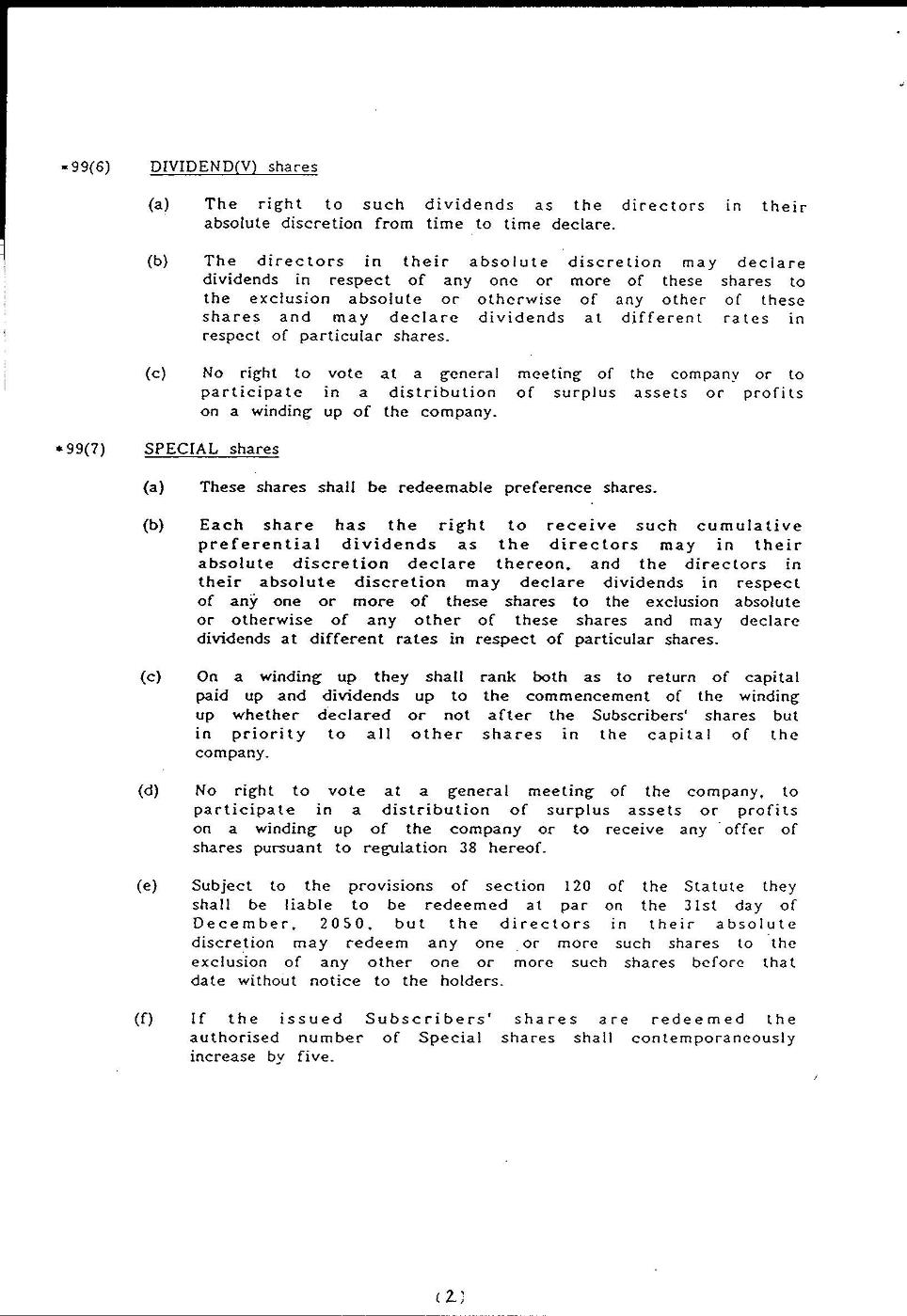

ANNEXURE “B”
STATEMENT OF ASSUMED FACTS AND MATTERS
Without any admission by any party the following facts and matters are to be assumed for the purposes of answering the separate questions.
1 The plaintiffs are interested persons for the purposes of section 1322(4) of the Corporations Act 2001 (Cth).
2 For the purposes of section 1322(6) of the Corporations Act, the Court is satisfied that no substantial injustice has been or is likely to be caused to any person.
3 The document entitled ‘Memorandum & Articles of Association of Liberty Oil (Australia) Pty Ltd Australian Company Number 082 879 641 A Company Limited By Shares Incorporated on 5 June 1998’, a copy of which is annexed hereto and is Exhibit A.1, was not prepared by Mr David John Boyle and was not signed by Mr Boyle or Mrs Mariangela Boyle, but by a person or persons unknown who simulated the signatures of each of Mr Boyle and Mrs Boyle.
